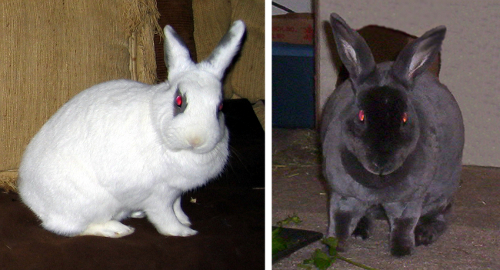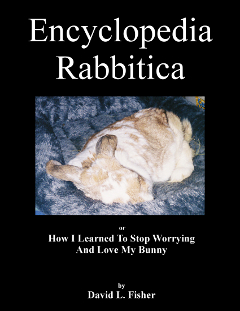
|
|||
|
|
|
|
|
Are You New To Bunnies?

Please take the time to learn up-to-date information on how to care for your bunny!!
The power of cute compels you!! These images show Trapper and Noffy giving me a dirty look for disturbing them with the "fwashy box". I thought the red-eye should remain in these pictures. If it looks like they're annoyed, then you're beginning to understand.
Rabbits are not like cats or dogs. Many people get rabbits expecting them to be like a cuddly dog and are then disappointed when they discover the rabbit's true behavior. With a little understanding you can have a very rewarding relationship with your bunny.
People also make the mistake of regarding rabbits as beginner pets, when in fact they are more like expert pets - unlike cats and dogs, rabbits are far more subtle with some things. They hide illness, they usually don't complain vocally, and many times someone brings their rabbit to the vet after an illness has gotten bad enough that the rabbit can't hide it any longer, and then it's too late. If you are new to rabbits, do everyone a favor and learn how to care for and understand them.
First, you just need to understand this basic concept:
- Dogs have masters
- Cats have owners
- Rabbits have staff (so put your nametag on and go serve your rabbits' desires)
Much of what we understand about bunnies today was unknown not long ago, so there is a lot of misleading information to be found from research and listening to friends. Please take the time to learn current information. Rabbits are very intelligent and social creatures, they require attention from their care-givers, they require toys and playtime distractions to avert boredom, they need exercise, they need proper food, they need everything that any other member of your family would need. If you're not enjoying the companionship of your rabbit, it may be because you haven't gained his trust and/or you haven't let your rabbit be a rabbit or a member of the family. They are very loving animals but they each show it in their own way, and it takes time and work to understand them in most cases.
 Rabbits should be
housed indoors
in appropriate accommodations, including a
litter box.
Outdoor hutches are essentially a cruel and miserable life for a
rabbit - they get no contact from their humans, and their humans never
learn how much personality and sociability their rabbit really has.
They also need exercise and attention. If you just leave your
bunny in a small cage all day long, you will have an unhappy and
potentially unhealthy pet on your hands that won't bring you much
joy. If you take proper care of your rabbit, you can look forward to
years and years of joy and love from your companion.
Rabbits should be
housed indoors
in appropriate accommodations, including a
litter box.
Outdoor hutches are essentially a cruel and miserable life for a
rabbit - they get no contact from their humans, and their humans never
learn how much personality and sociability their rabbit really has.
They also need exercise and attention. If you just leave your
bunny in a small cage all day long, you will have an unhappy and
potentially unhealthy pet on your hands that won't bring you much
joy. If you take proper care of your rabbit, you can look forward to
years and years of joy and love from your companion.
A rabbit is very easily litter-box trained and most are meticulous about only going in certain spots, so you may need to accommodate your bunny in this matter. You will always find an occasional poop here or there, but they are not offensive, and my simply have stuck to the bunny's bottom while he was in the litterbox and fallen off later. Other times a rabbit will leave a lot of poops in a certain area - this is territorial behavior, perhaps caused by visitors the rabbit didn't like, or the introduction of a new pet that the rabbit isn't sure about. There are some times when a rabbit will forget his litterbox training, which is very often a cry for help (he's trying to tell you he doesn't feel well, and wants to make sure you inspect his leavings to investigate why he's not feeling well).
Like all animals, rabbits can be destructive if not given the proper care and attention. It is up to you, not the rabbit, to make the relationship work. You are, after all, a presumably intelligent person - the rabbit is just a super-smart animal who tries to communicate with you and wonders why you don't understand.
 If you got a rabbit very young, you really really need to get it
spayed or neutered when it's old
enough, to prevent it
from going through all of the hormonal ups and downs of adolescence.
This will calm the bunny down considerably, and also make it much
easier to get along with. It will also put an end to certain
behaviors (such as courting, humping, mounting, spraying, and some of
the aggresive behavior that go with hormonal floods).
Females can become pregnant as young as 3 months of age, and within 15 minutes of giving birth due to coitus-induced ovulation (mating almost guarantees a pregnancy), so you need
to keep unaltered males and females separated until they can be
spayed/neutered.
Also, since unspayed female rabbits have better than an 80% chance to get
reproductive cancer by age three, it is imperative that you spay
her. Most rabbits surrendered to shelters are un-altered and the
people were having behavioral problems with the rabbit, and simply
didn't realize that if they had taken proper care of it, including
spay/neuter, they would have had a wonderful loving companion and
member of the family.
If you got a rabbit very young, you really really need to get it
spayed or neutered when it's old
enough, to prevent it
from going through all of the hormonal ups and downs of adolescence.
This will calm the bunny down considerably, and also make it much
easier to get along with. It will also put an end to certain
behaviors (such as courting, humping, mounting, spraying, and some of
the aggresive behavior that go with hormonal floods).
Females can become pregnant as young as 3 months of age, and within 15 minutes of giving birth due to coitus-induced ovulation (mating almost guarantees a pregnancy), so you need
to keep unaltered males and females separated until they can be
spayed/neutered.
Also, since unspayed female rabbits have better than an 80% chance to get
reproductive cancer by age three, it is imperative that you spay
her. Most rabbits surrendered to shelters are un-altered and the
people were having behavioral problems with the rabbit, and simply
didn't realize that if they had taken proper care of it, including
spay/neuter, they would have had a wonderful loving companion and
member of the family.
Rabbits are delicate creatures, so please learn how to handle them. It also helps to understand what your bunny is trying to tell you. Rabbits have very delicate digestive systems and specific dietary requirements, so please read the section on feeding. They also have very specific health requirements and without proper medical care, some problems quickly become fatal. Your bunny will also need you to groom him from time to time, especially during molting, to prevent gastric hairballs.
 Rabbits are not dogs or cats. Rabbits are not stuffed plush toys.
Rabbits are not cartoon characters. You will need to drop some of the
misconceptions you may have about how a rabbit behaves in order to
truly enjoy the individual animal you have. if you are new to
rabbits, some things to remember are:
Rabbits are not dogs or cats. Rabbits are not stuffed plush toys.
Rabbits are not cartoon characters. You will need to drop some of the
misconceptions you may have about how a rabbit behaves in order to
truly enjoy the individual animal you have. if you are new to
rabbits, some things to remember are:
- It takes time to gain your rabbit's trust (they are, after all, prey animals)
- Rabbits typically do not like to be held or picked up (see handling for more information)
- Some expressions of affection are easily misinterpreted (like spraying and nipping) (see behavior for more information)
- Rabbits are very intelligent and sensitive animals and require a lot of love and attention to thrive - this means they do NOT belong housed outdoors
- Like all living animals, rabbits act based on their instincts and the sum of all of the experiences they have had - do your best to provide good experiences and you will have a happy rabbit as a result
- Rabbits can live 8 to 10 years or even longer, if properly cared for
- Rabbits are chewers, so you need to give them toys to chew on
- Rabbits require playtime and plenty of exercise
- More coming soon...
 Not sure about your bunny?
One of the true heartbreaks of a misunderstood bunny is simply this: A
family gets a rabbit, but doesn't know much about how to take care of
it or how to socialize it or gain its trust. As a result, the bunny
is skittish around humans, and the humans think the bunny is just not
interesting, so they begin to lost interest in it, and put less effort
into gaining its trust. In turn, they see a less trusting rabbit and
they think that their rabbit, or any rabbit, is just not an
interesting pet. Nothing could be further from the truth, but it
takes understanding of rabbits and their behavior, and dropping
expectations that they will be like a dog or a cat, before anyone can
really see how wonderful they are. Any rabbit living in an outdoor
hutch has so little contact with humans, and for such short periods,
that not much trust develops, and the humans really don't see the
personality in the rabbit just waiting to come out.
Not sure about your bunny?
One of the true heartbreaks of a misunderstood bunny is simply this: A
family gets a rabbit, but doesn't know much about how to take care of
it or how to socialize it or gain its trust. As a result, the bunny
is skittish around humans, and the humans think the bunny is just not
interesting, so they begin to lost interest in it, and put less effort
into gaining its trust. In turn, they see a less trusting rabbit and
they think that their rabbit, or any rabbit, is just not an
interesting pet. Nothing could be further from the truth, but it
takes understanding of rabbits and their behavior, and dropping
expectations that they will be like a dog or a cat, before anyone can
really see how wonderful they are. Any rabbit living in an outdoor
hutch has so little contact with humans, and for such short periods,
that not much trust develops, and the humans really don't see the
personality in the rabbit just waiting to come out.
Please give your rabbit a chance to show you how wonderful he/she is - please spend a lot of time with your bunny and get to know them, and see who they really are.
Recommended Reading:
The House Rabbit Society's page on if you're the right kind of person to live with a rabbit
Twelve Things to Consider before You Adopt
The San Diego House Rabbit Society's page on things to consider before getting a rabbit
The House Rabbit Society's page on what rabbits are really like
How are Rabbits Different from Cats & Dogs?
The Sacramento House Rabbit Society's page on the differences between rabbits and more common pets
The Sacramento House Rabbit Society's page on having a rabbit in the house
(online video)
The Sacramento House Rabbit Society's page bonded rabbits
Dana Krempels's article on why rabbits belong indoors
Why to Keep Your Rabbit Indoors
The San Diego House Rabbit Society's page on the difference between rabbits housed indoors and those confined to outdoor hutches
House Rabbits: Why It's Better for You and Your Bunny
Zooh Corner's article on why rabbits belong indoors
Zooh Corner's article on bringing an outdoor bunny indoors
Preparing for the New Family Member
Zooh Corner's article on preparing your home for a new bunny
A Rabbit in the House - Now What?
The San Diego House Rabbit Society's on how to structure your rabbit's environment for success
The San Diego House Rabbit Society's article on understanding your rabbit
Resources for New Bunny Owners
The House Rabbit Society's index page of resources for new bunny owners
The Sacremento House Rabbit Society's article on getting along with your bunny
The House Rabbit Society's article on helping your new bunny get accustomed to his new home
Understanding Your First Rabbit
Dana Krempels's article on understanding your rabbit
Jordan's Journal: A Diary of Rabbit Adoption
One person's journal on the experience of adopting a rabbit
This page is still under construction, we hope to add more content soon3 Bunnies Rabbit Resources
All Rights Reserved
About Us
Contact Us
Site Map
This site is supported strictly by donations from our readers

A Buck for the Bunnies
Last update: Sun Jun 28 21:49:23 EDT 2020




